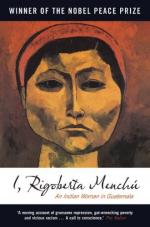|
This section contains 508 words (approx. 2 pages at 400 words per page) |

|
I, Rigoberta Menchú: An Indian Woman in Guatemala has a dual literary heritage, descending from ancient Mayan/Quiché Indian culture and shaped by modern Guatemalan social forces. As a spoken narrative which was transcribed and put into print by ethnographer Elizabeth Burgos-Debray, and translated into English by Ann Wright, Menchú's story was left virtually intact the way it was narrated. The act of telling her life story, replete with recommendations, explanations, as well as concealed information, is one of testimonio, a form common to Indian culture. Testimonio, or testimony, is, according to Zimmerman, "a culminating life act," and Menchú's testimonio is "like that of one who is going to die." In describing the funeral ceremonies in the Indian community, Menchú notes that before death, the dying will call his family to him and "tells them his secrets, and advises...
|
This section contains 508 words (approx. 2 pages at 400 words per page) |

|




